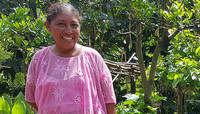Policies, programmes and legal frameworks
Political commitment is crucial for change, but it is not enough on its own. Commitment must be reflected in policies, laws and investment plans across a number of sectors, if the most vulnerable sections of the populations are to see any improvement in their lives.
Therefore, if a country is to effectively tackle and end malnutrition and hunger, its policies need to factor in food security and nutrition outcomes.
Increasingly, countries recognise the need for support to guide them through this process. FAO is assisting them in assessing how well existing development policies address current and future food security and nutrition trends of the country. Once countries have taken an accurate stock of their policy needs, FAO helps to redesign new ones that are far-reaching and inclusive so that everyone can reap the benefits, including the poorest and most vulnerable.
How we work
POLICY ASSISTANCE
FIRST: FAO-EU partnership
GLOBAL FRAMEWORKS
Decade of Action for Nutrition
From the field
Giving women in Guatemala a voice in food security and nutrition
While gender equality in Guatemala has improved in recent years, male hegemony still strongly characterizes the culture, particularly in rural areas.
Men typically manage the material, social and political resources and make the decisions. In rural Guatemala, domestic tasks are considered to be women’s primary responsibilities and take precedence over income-generating activities. Women often have low levels of education and rural areas offer them very few formal employment opportunities. If rural women do work on their family farms, they do not get paid nor do they get any recognition for the work they do as farmers.





